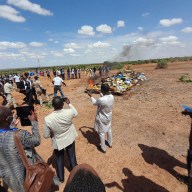THE HAGUE, Netherlands – The chief U.N. war crimes prosecutor said Tuesday he expected the trial of Radovan Karadzic, the Bosnian Serb wartime leader, to be a tough case – made even more difficult by Karadzic’s insistence on leading his own defence.
Serge Brammertz said he is confident his prosecution team is ready for the trial and pleased it is finally due to start Monday after 15 months of preparation.
Karadzic’s trial at the Yugoslav war crimes tribunal is likely to last more than a year, with an appeal could take the case into 2013.
He is accused of 11 counts of genocide and war crimes for masterminding Serb atrocities during the 1992-95 Bosnian war when an estimated 100,000 people were killed.
“We are not expecting it will be an easy trial,” Brammertz said. “What we will try to do is stay focused, to try to make clear what it is about.”
He said the essence of his case was to prove Karadzic orchestrated a plan of ethnic cleansing of non-Serbs from parts of Bosnia, “to have tens of thousands of people removed from their areas by killing them, by putting them in camps and by an important number of rapes.”
Karadzic’s decision to represent himself, although he has no legal background, has raised the prospect of a prolonged trial and political grandstanding, as happened with his one-time mentor Slobodan Milosevic. The former Yugoslav president dragged out his trial for four years until he suffered a fatal heart attack in jail in 2006.
Brammertz said he was critical of self-defence cases because international war crimes law was complex and difficult even for trained lawyers. “I’m not always sure this is in the interest of justice” to have an inexperienced person in charge of the defence.
Prosecutors will outline their case in a two-day opening statement next week, followed by Karadzic’s opening defence statement the following week. Brammertz, who handed in his final streamlined indictment on Monday, has submitted a list of 409 witnesses he plans to call, but 230 of them will present written testimony to save time. They will be available for cross-examination, he said.
He said the prosecution would deal with the alleged crimes chronologically, beginning with the sniper siege of the Croatian capital of Zagreb and concluding with the 1995 massacre of some 8,000 Bosnian Muslims in the U.N.-declared safe haven of Srebrenica.
Brammertz said he hoped the start of the high-profile trial will spur the hunt for the last two fugitives indicted by the U.N. court, including Karadzic’s top wartime general Ratko Mladic. The second fugitive is ex-Croatian Serb leader Goran Hadzic.
Both were likely hiding in Serbia, he said. Their arrest would be “a clear message that nobody can sit it out” and elude justice.
Karadzic was arrested in July 2008 after 13 years on the run. He had been hiding disguised as a bushy-bearded new age teacher, but little information has emerged about how long he had been in the Serbian capital or how he evaded capture for so long.












